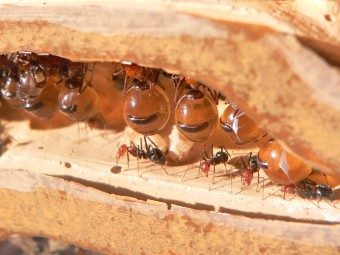Animal Facts Part 3: A Doughnut Brain, Dung and the Milky Way, Ant Overlords and More
 In this episode of The Brain Food Show, we start by looking at the massive creature that has a doughnut shaped brain with its esophagus running right through the middle.
In this episode of The Brain Food Show, we start by looking at the massive creature that has a doughnut shaped brain with its esophagus running right through the middle.
Next we discuss Wix! Go to https://www.wix.com/go/brainfood to get started on your website today!
Check out our website at https://brainfood.fm
Next up we begin by looking at the fascinating reason Dung Beetles do a little happy dance after they find and roll up some poop. We then move on to a myriad of fascinating facts about various ants, including their absolutely remarkable ability to find the most efficient route to something, which has in recent years been used by humans to come up with more efficient algorithms for a variety of applications. We follow all that up discussing a rather unique and hilarious way school swimming herring talk to each other.
On another note, if you could do us a huge favor and rate and review this show in whatever podcasting platform you’re using (including hopefully giving us some feedback related to the new format), we would be extremely grateful. Thanks!
(You can also discuss this episode and view references on The BrainFood Show forum here.)
Don’t miss future episodes of this podcast, subscribe here: iTunes | Spotify | Google Play Music | Stitcher | RSS/XML
You can also find more episodes by going here: The BrainFood Show
Podcast (brainfood): Play in new window | Download (Duration: 50:27 — 69.3MB) | Embed
Subscribe: Apple Podcasts | Android | Google Podcasts | Stitcher | RSS
| Share the Knowledge! |
|





All cephalopods, nautilus, cuttlefish, and octopodes, have this brain issue. They have a beak and radula, sandpaper roll of teeth pretty much, to break the stuff down. Helps prevent brain food interaction of an unpleasant sort. Sea stars have the same configuration except the nerve ring (not really a brain) opening is bigger but they move their stomach outside their body to eat.
Cat poo parasite one: Toxoplasmosis. There are vague connections of it to risk taking and testosterone/dopamine levels, but it’s still a rather weak link so far.
Fun podcast. I don’t usually listen to podcasts but listened to all of yours.